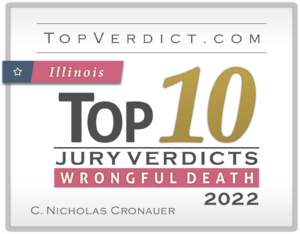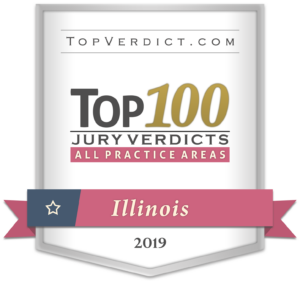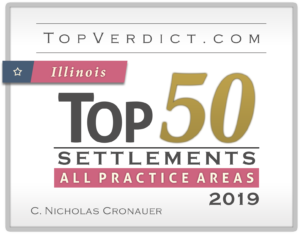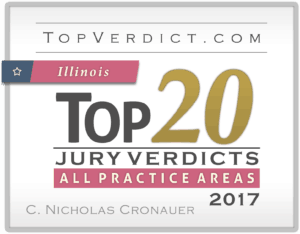Kenny and Chicago attorney Nick Cronauer of Cronauer Law discuss the details behind Nick’s latest record-breaking verdict. His client, 25-year old young man, was killed in a single motor vehicle crash in Sandwich, Illinois on June 28, 2015, after being over-served at a bar in DeKalb County.
kenny Berger: Hello, and welcome to best practices with Kenny Berger. Our guest today is Chicago trial lawyer, and my good friend, Nicholas Cronauer. Nick, welcome to the podcast.
Nick: Good afternoon, Kenny. Thanks for having me on. Good to see you.
kenny Berger: You too, buddy. You know, this is usually where we ask, like, “tell us about this and tell us about that.”
kenny Berger: But the best approach for today I think is, is kind of just a jump right in. You just got a big verdict recently, a very hard earned verdict on a Dram-shop case.
Nick: I did. Yeah. Thank you. And it’s kind of funny in hindsight, I think when you kinda leave, obviously everything on the field, and you look back at the result we got, I think it was really good.
Nick: And part of me is like, man, maybe we’re a little crazy for, for pushing as hard as we did, but it worked out and, you know, I got a lot of people to thank and being a trial lawyer, you kind of build on other people’s successes and no doubt, this one was a result of that.
kenny Berger: Tell us kind of the, the background of the case.
kenny Berger: What what’s. What are the facts? The, the one to two minute version, just background was
Nick: The background: you know, this case in Illinois, Illinois’s got terrible Dram shop law. It’s a great place practice, but there’s a few bad, bad laws. And this is one.
Nick: So generally there’s a cap on damages. And basically the, the short story is guys are at a bar.
Nick: They get overserved, both pass away.
Nick: As soon as we got the case, there’s a whole backstory on, on, on that. The goal is how do we maximize the recovery? Cuz when, when someone dies, obviously the Dram shop limits in Illinois. I bear say this. I don’t, I don’t even know what they are. They’re low.
Nick: I never focus on that, so I didn’t care. low $150,000, maybe tops, I think at the time was maybe even $85,000. So the goal is always, ” What’s the escape hatch?” In this case we had some, some good facts that we were able to allege negligence count, which is, you know, independent of the jam, able to get that by motion dismissed, summary judgment, and got it to the jury.
Nick: And the jury found negligence along with the Dram Shop violation and then gave damages of $4 million, which was reduced,
kenny Berger: but it was, it was reduced to what, $2.5 is that what I saw?
Nick: $2.5 after the decedent’s fault? Cause he, he was 39% at fault.
kenny Berger: Got it. So that part I did know, or I did know that there finding, comparative and I think I did know that there was also a place called DeKalb county involved. But other than watching, like some crime shows and WGN as a kid, I couldn’t really tell you anything else about DeKalb county.
Nick: Yep. So it’s about hour outside Chicago. It’s more of a rural “quasi conservative quasi…” now I don’t know it’s changing with a lot of things, but there’s a record verdict for this county in this county.
Nick: Other people told me if you could $500,000 that’s a good day. But as you know, loss of life is worth way more than $500,000. I’m glad the jury agreed.
kenny Berger: Yeah. And, and everybody, you know, no matter, I think your, your political leanings, your background, I think most people, not everybody, most people understand and value life.
kenny Berger: If not other people certainly their own.
Nick: Agreed that, you know, the problem is too many lawyers value life with “what’s your earning potential.” You know, that was one of the hurdle we had in this case is he really didn’t have he’s 25 years old. His earning background was working for a bartender probably never made more than $15,000, you know?
Nick: So you take that over the rest of someone’s life. And just how most lawyers build out their cases. I mean, the number’s not that big.
kenny Berger: So help me understand what’s the difference between a negligence claim and a Dram Shop claim in Illinois.
Nick: So basically the Dram claim revolves solely well in the over service of alcohol.
Nick: So, you know, if someone gets drunk at a bar and causes harm, The bar in Illinois is liable for the over service. And it’s capped at, you know, depends if it’s an injury or a death limits go up every year. So that is good. You know, there’s. Not high enough. I think back in this case was filed. The limits are $85,000.
Nick: Like I said, now they’re in into the low one hundreds, but basically if alcohol is served irresponsibly there’s limits,
kenny Berger: Nick, just to jump in, do y’all have first party and third party Dram Shop. In other words, like let’s say in South Carolina, for example, if someone goes to a bar and gets drunk and goes off the road and dies due to their intoxication, unless they’re a minor, you can’t bring that case.
kenny Berger: But if that Drunk driver crosses the center lawn hits somebody and enter a third party, the third party arguably has a Dram shop case.
kenny Berger: So good question. We actually just had this case and I learned this and we actually got a good result. Luckily, but apparently, so I think to answer your question, I don’t, I don’t, they don’t really classify it as, as that, but if the drunk driver passes away, the drunk driver can’t Sue the bar.
kenny Berger: Right. So in Joel’s case,
kenny Berger: did you have, you didn’t have the driver, you had. Correct passenger, or you had somebody else
Nick: Chaz was the passenger in the car. So yeah,
kenny Berger: those are hard cases
Nick: sure. And
kenny Berger: we’re like, no
kenny Berger: shit. I just tried it.
Nick: yeah. And it’s one of those things, again, hindsight’s like, man, you know, we turned down basically $650 the night before trial.
Nick: I’m glad I did, but again, talking to more lawyers and go through the facts, a lot of people look at me like I’m crazy.
Nick: Yeah. We got a passenger to 0.301 BAC. He worked at the bar. The driver worked at the bar. They weren’t working the night at the crash, you know, testimony which a whole nother backstory from a key witness that the sheriff had to bring in testifying that she was begging with him not to get in the car with Sam.
Nick: He did. And obviously they had a single vehicle crash and both Perished
kenny Berger: so Sam was the driver and he died. Yep. Correct. Your client’s name is
Nick: Chaz
kenny Berger: Chaz.
Nick: Yep.
kenny Berger: And Chaz also dies. So, so take us back to that distinction between Dram shop and, and negligence. What did the bar negligently do or not do apart from the over service?
Nick: In our case, we able to allege a voluntary undertaking amongst other negligence claims. So basically if you can allege some type of negligence unrelated the alcohol in this case, it was the fact we had evidence that the shot girl attempted to follow. Sam and Chaz home to make sure they would get home safely.
Nick: She was initially supposed to drive Chaz home, but they decided at 3:40 in the morning that, you know, after pleading with Chaz, that Chaz was going to ride with Sam. She made the decision to follow them home, make sure they got home safely. And obviously that. Failed. So basically we are as negligence,
kenny Berger: but how, how is that?
kenny Berger: I mean, this result is becoming more and more astounding. The more we talk about this, and I’m not trying to play devil’s advocate, I’m trying to get, I’m trying to become a better lawyer here. How, how is it negligence on the part of the bar for one of their employees to try to follow them home and wasn’t following them home outside the course and of that woman’s work.
Nick: Correct. So she worked there, she, they denied, she was an employee. We, we argue doesn’t matter. She was an agent. So there there’s a little bit more of the story they showed up at 1:45 the bar was supposed to close at two, so they were all there.
Nick: And there’s video of Sammy actually working quote unquote, you can’t see my air quotes working on surveillance footage, you know, to shut down the bar and around again, 3:45, they leave it’s obvious there it’s basically turned on after party. So 3:45, you know, after they’re finally closing down the bar, you know, another allegation we made is basically here’s these individuals, one of which was literally laying in the door threshold.
Nick: 11 minutes before he drives Chaz home, literally laying in the door threshold for seven minutes. You’ve got the shot girl stepping over him. You got the bar manager stepping over him. So, you know, one of the other neglige allegations is there’s, there’s some case out there it’s basically like “you forced someone leave” that that is independent of the alcohol service.
Nick: You’re basically forced them into a bad situation. So that’s kinda the negligence too. And then the voluntary undertaking comes in at least in Illinois because, you know, we argued, she assumed a duty. To get them home safe. She could have called 9 1 1 you could have. And, and obviously the, the evidence was nine one.
Nick: One’s the last case scenario, but you’ve got Uber. You’ve got Lyft. She’s Facebook messaging, the mom afterwards. I mean, there’s, there’s other options available. And the option to follow a drunk driver home was clearly, you know, a breach of their undertaking to get them home safely.
kenny Berger: One, one fact, I really like here is that they continued serving alcohol at the bar as employees of the bar, even though the bar is closed.
kenny Berger: I mean, clearly they’re still acting as employees beyond closing time and continuing to serve in furtherance of the, the bar’s business past 2:00 AM, presumably to both Chaz and Sammy.
Nick: Correct.
Nick: And we hammered them on that. But you know, that, that was also kind of a double edged sword because Chaz was, you know, there was a dispute, was he an assistant manager or a manager?
Nick: He started the trial, an assistant manager by the end, you know, the defense made him the manager head honcho. So all these rules that we were talking about, you know, always kind of came back to bite this because at the end of the day, Chaz knew the rules. You know, he wasn’t some bar patron who has worked in a bar.
Nick: I mean, Chaz was, was at least an assistant manager. And had, you know, bar experience. But the argument the whole time is in that I think sold as far as liability is, you know, these bars, when they get their liquor license, that’s a promise to follow the responsible distribution of alcohol. Because if you don’t follow this responsible distribution of alcohol, bad things happen, we know bad things happen, and this is a way to make sure bad things don’t happen.
Nick: So you know, I went into trial. And accepted responsibility for Chaz. You know, I didn’t try to play up. Chaz was drunk. He didn’t know what he was doing. He’s too intoxicated. I said, Chaz is at fault, but I said, you know what? Other people are at fault and that’s your, your responsibility to hold the other people accountable that are refusing to be held accountable.
Nick: Like we are, that helps rather than try to fight, fight with the defense on, on, you know, Chaz shouldn’t be, be at fault. Yeah. And
kenny Berger: Nick, let me ask you this, going back to the driver, tell me his name. Sam Sam. I apologize. All right. So Sam or, or Sammy, you know, he starts the trial as the assistant manager. By the end, the defense has painted him as, as a manager was, was the tactic there, or the strategy for them there to basically put as much culpability on Sam or Sam.
kenny Berger: Is possible thus removing responsibility for themselves, or are they not arguing themselves into kind of a separate course and scope argument?
Nick: Y yes. You know, You know, there’s some things the defense did. I’m still scratching my head and, you know, I think the large part is you’re right, is just to try to pass blame.
Nick: You know, the more you can blame, blame the dead people, the better for them. Right. And again, we were hammering ’em on, on, on what is a reasonable. Bar supposed to do. We had good ordinances. We had their employee manual. We had common sense. And I think we just kept beating ’em with that. You know, they were kind of trying to say, well, if it applies to us, it applies to Sam.
Nick: And we had, we had lots of side bars on that because at the end of the day, these rules regulate the bars. They don’t regulate, regulate the patrons. Right. But you know, there’s, there’s what the law says. And there’s what a jury does. And those things don’t aren’t necessarily the same.
kenny Berger: Did y’all have an alcohol service?
Nick: We did. She was awesome outta Florida. Liz Trendowski
kenny Berger: Liz Trendowsi!
kenny Berger: Liz wouldn’t mind if I imitated her voice right here on the podcast Trendowski.
Nick: that’s really good. That’s close.
kenny Berger: All right.
kenny Berger: But Nick, Nick, thank you. Yeah. She’s she’s she’s retired.
Nick: Yep.
kenny Berger: yeah. Yeah. We had to look other places than Liz.
Nick: Which is too bad. I mean, she’s too young to be retired,
kenny Berger: you know, I think you’re right.
kenny Berger: I’ve got a really funny Liz Trendowski story. Just real quick. We’re in deposition defense lawyers trying to beat her up. Liz is, is holding her own just fine. We go on a break and we go on the break. We were doing it by video and Liz didn’t realize that her audio wasn’t muted and we hear Liz Trendowski and, and her perfect Liz Trendowski voice.
kenny Berger: Whoa. She’s a catty one. Isn’t she? .
kenny Berger: That’s awesome.
kenny Berger: So pretty good. All right. So, so Liz was your expert.
Nick: She was great. I thought came across well, you know, really in there’s whole other side story. I mean, she was in a hotel in Sycamore, Illinois for what, two days?
Nick: Waiting to go on her and I here use Dr. MIlzof. He was our forensic toxicologist.
kenny Berger: I’ve heard the name.
Nick: He did, did a good job, but yeah, she, she did well and she cleaned up, cleaned up. Nice. She went on, we kind of got, actually got, got hacked a little bit from the bar manager and she went on, I think right after her and did a really good job kind of making the bar manager look like she was obviously out for herself.
kenny Berger: Yeah. And so,
kenny Berger: you know, I thought when, when you said, look, we tried to kind of boil the case down. The simple thing that we kept hammering on, hammering them on was. You know, when, when you, when you said it that way, you know, look to get the alcohol license, here’s what you’re gonna do. And if you don’t do those things, bad stuff happens.
kenny Berger: I mean, just boiling it down to, to its absolute core is super powerful. What. You know, what, what was your process in terms of kind of reaching the absolute core truths or core facts of your case?
Nick: You know, at the end of the day, I spoke to a lot of other attorneys that tried a lot more Dram cases as much as I’d like to say, I came up with it myself, just talking to other, you know, great lawyers talking to what they did, how they did it.
Nick: They’ve gotten good Dram verdicts. Cause I mean, you know, when alcohol’s involved, it is tough. It is easy to blame the victim. Easy to basically say, well, they got what was deserved and just talking to other people kind of. Said here. Here’s how what’s worked for me. And I kind of took it and ran with it.
Nick: And closing, I held up the, you know, the liquor license that was exhibit one into evidence and closing had my fingers know behind my back with my fingers crossed and told ’em, you know, they wanna accept the privileges of this, this ability to serve alcohol, but they don’t want the responsibility. Right. And that’s your, you know, that’s your job Jury is to make, make ’em responsible and then cross those fingers, and think it, it obviously worked.
kenny Berger: Absolutely.
kenny Berger: Let’s talk about damages Nick in Illinois, wrongful death damages. Does it go towards statutory beneficiaries? Be it spouse, kids, parents, and the absence of spouse or kids.
Nick: Yep. So you’re exactly right. So there’s wrongful death, which generally does not follow the probate act. Right? So in wrongful death in Illinois, that generally, unless there’s a family agreement, the judge is gonna make a dependency determination.
Nick: In this case, we had a 25 year old with no spouse, no children or dependence. So then basically it went back to an earlier dependency finding by the judge. Between the, the parents and our client, unfortunately had no relationship with his father only his mother. So, you know, it flows of the estate and it’s gonna flow 99% to her ultimately after finding by the judge.
kenny Berger: So, so mom’s client and a ticket mom testifies.
Nick: Yep. She did.
kenny Berger: What are the main points? The memorable pieces of mom’s testomony be it on direct or on cross?
Nick: You know, I mean, at the end of the day, you’ve, you’ve got a, a deserving mother, you know, obviously been through, been through a lot, you know, and I, something about me, you might not know, maybe had an unfair advantage is I,
Nick: I lost a four year old. Son three years ago. So, I mean, I, I kind of, I mean, I know what it’s like, I know what, what, how that feels and what it’s like. And I, you know, went through a lot of pictures, just how things have changed, what she missed them.
Nick: I can’t remember now, but the way we ended, I can send it to you once we have transcript, the way it ended with her testimony, I remember it was really powerful.
Nick: She just did, did well and was able to explain it. You know, basically I think the way she ended it was, you know, Chaz is a better human being than she was.
Nick: him not being here is, you know, gonna never feel the void that that was left, but she’s just very, very believable, very credible, very eloquent.
kenny Berger: And, and do y’all have an allocation. Between survival and wrongful death in Illinois.
Nick: Yes. But here’s, what’s weird about this case. We did not have a survival action because the coroner testified that they died on impact, which yeah.
Nick: I don’t know how, how accurate that was, but you know, I, wasn’t gonna go against the county coroner and bring in an expert and say, no, they survived for a minute, two minutes.
kenny Berger: So, so the damages just flowed to mom. It was just for her loss, companionship, grief, sorrow, other things. And she was not economically dependent on him.
Nick: Correct. We put it in testimony that she probably would be in the future. I, you know, if she aged but have our economies with Stan Smith. And, you know, he gave a range of $600,000 to $2.5 million, depending on obviously various future things that had to come true. The 2.5 is if he got a college degree, cause he had some community college.
Nick: But the jury gave us 500 for, for that.
kenny Berger: Got it. And for, for the, for the non-economic damages, who, other than mom testified as to mom’s loss, if anybody just mom.
Nick: So I, I’m a big believer and I don’t talk about lots of stories about this. See what your thoughts are.
kenny Berger: Sure.
Nick: The jury believes your client you’re gonna win.
Nick: If they don’t believe your client, I think you could have 27 witnesses take the stand and it’s not gonna matter. I’ve kind of lived, lived my life. That way I could be wrong and probably am, but I try to get in, get out, get to the point and I don’t like to belabor. And I’ve just, I dunno, it seems like the more trials I’ve done, if they like your client, you’re gonna win.
Nick: If they don’t like it doesn’t matter.
kenny Berger: I believe if they don’t like your client, forget it
Nick: for sure. It doesn’t matter how many character witnesses you put on the stand. They don’t like your client. You’re not gonna win. So, you know, we didn’t call the dad. We talked about, they had a bad relationship. It was just the mom.
kenny Berger: Yeah. I mean, the, you got me thinking about if, if they do like your client, what what’s still maybe necessary in this case. I mean the loss of a child, even for people who don’t have children or haven’t lost a child is still so understandable. I mean, there’s just your empathy immediately kicks in for most people.
kenny Berger: I love that approach here.
Nick: And we had trust me, we had one on the jury and this, again, he, he had no empathy, but in Illinois we have 12 jurors. It’s gotta be unanimous. I would kill to have state where it’s like nine out of the 12. Cause we had, we had one that was apparently like back these 23 year old, you know, young, young, white male.
Nick: No empathy. Apparently it was back. They ready to cry about having to give any, any money, but came around four.
kenny Berger: Yeah. He’s he’s got no empathy for the mother child’s been taken. He has total empathy for the idea of anybody for money having to be paid for something like this. That’s that’s an interesting.
Nick: It’s funny. You say that because that from gathering, talking to the jury, he didn’t sick around. He, he fled, but talking to him about him is that’s, that was his big concern is this is more money than I’m ever gonna make. This is more money than most people make. And finally, some of the moms on the jury said, this isn’t about you.
Nick: It’s not about you. It’s about Laura, you know, get, get over you yourself.
kenny Berger: And, and then the, for the split or division between actual damages and punitives any punitive damage.
Nick: No. Again, you know, in Illinois, we’ve got kind of bad punitive law and that always runs the risk of then you’re gonna blow your insurance coverage.
Nick: So no, no. Punitives which I, to be honest, would’ve been a good punitives case, but you know, some of the evidence came out, this guy used to own five bars. Now he is down to one. You know, what’s crazy. It came out on the stand. I didn’t even realize this. He was deposed a few years ago. This case was delayed due to, to COVID, you know, in Montana, I was talking about this case.
Nick: We were supposed to go to trial last year, but anyway, he comes out in the stand that this guy’s now an Allstate insurance agent.
kenny Berger: Holy shit.
Nick: Yeah. That was outta left field. And volunteers is on the stand before the jury, which I don’t know in hindsight maybe was good for us cuz the jury starts thinking, well clearly he has insurance then.
Nick: Right?
kenny Berger: So Nick, we talked we talked some about liability. We talked about damages. We alluded to some of the defenses, but in terms of the defense’s cases, case in chief, what did they put up?
Nick: So here here’s something else that, that kind of threw me. I was not expecting this, you know in opening, I I’m big on, as you know, most attorneys are now you gotta talk about what what’s the defense gonna say, right?
Nick: Here’s the defense, the defense case and why are they wrong? They basically two, two defenses. The first one I knew the second one coming by surprise. This whole night was caught on surveillance. They in opening statement, told the jury. The reason Sammy looked intoxicated on video is because there’s video of him getting kneed in the nuts, like literally that that was their defense.
Nick: And the second one was that. So we had a BAC, the corner had the BAC done. You know, Sammy was a .209, chaz was a 0.301. The other defense was that BAC was not reliable. You can’t, you can’t depend on it. We can talk about reasons why, but that was basically their, their, their two defenses. So by the time they actually put on their case, they called one expert, a pharmacist to talk about why the BAC blood draws were, were not reliable after, in our case in chief crossing everyone in, even Liz Trendowski it was great.
Nick: You know, getting hit in the nuts. And how does that feel? And, and, you know, doesn’t it take a while for people to recover. You know, we objected to it, but judge overruled it. So,
Nick: unfortunately,
kenny Berger: I’m just thinking as a dude, I’m thinking, man, do I have, you know, a de impaired judgment after that happens to me?
kenny Berger: Do I have decrease inhibition? Do I have, you know, altered or impaired motor skills? Maybe? I mean for a minute, am I in pain? Yes. Does it, does it result me stumbling around and going off the road couple hours later? No, I mean, The old kneed in the nuts defense. If I’ve heard it once, I’ve heard it a thousand times.
kenny Berger: I mean, what in the hell?
Nick: I said part of me was, I, I guess
Nick: it’s just so crazy then I totally didn’t even see it coming. But at the end of the day, the jury was like, yeah, we didn’t buy into that. I mean, to your point, you know, be, get kneed in the nuts isn’t why you can’t navigate a slight turn at four in the morning and hit two trees and the car catches on fire.
Nick: That’s not from getting kneed in the nuts. That’s from being intoxicated.
kenny Berger: You know, I’m thinking about this, I’m, I’m imagining kind of the defense team at some point before trial thinking, Hey guys, gals, Nick, and, and these, this plaintiff, these guys are never gonna see the kneed and the nuts defense coming.
kenny Berger: It’s like, okay, I guess we didn’t, you know, got me, got me in,
kenny Berger: you know, calling me shocked.
Nick: So their star witness was the bar manager, Amanda, and, you know, You know, lesson learned. At that point in time, she was pissed off. They’re under subpoena , mad. We had to get other witnesses in.
Nick: She see she’s sitting around, we didn’t want her to go for, you know, our order proofs. There’s a lunch break. We’re supposed to go tell her she gotta come back. We’re all scared. Cuz she’s just in the hallway fuming. Right? So we call her in the judge tells her you gotta come back at one. Okay. I’m convinced and you know, we basically call her at that point. We just basically wanted the jury to see, you know, this is the person walking over Sammy de Marco laying in a door threshold 11 minutes before he is about to drive home drunk. She. Just did not come across nice likable. Right.
kenny Berger: And this was not the woman who followed them, correct.
Nick: This is not the woman who followed em, this was the bar manager who’s on surveillance, you know, letting Sammy take drinks from behind the bar and serving drinks, you know, after hours. So, I mean, we basically no purpose to put her on other than we wanted the jury to see what she was like. Right. Well, again, you know, famous Midwest “saying pigs, get fat hogs, get slaughtered.” I mean, we probably should have let her go because she left there and I’m, I’m convinced I didn’t ask the other attorney. I’m convinced he prepared her over the lunch break, cuz she just went on the stand. And I mean, that was, that was the only time at trial. I was like, man, that, that hurt well prepared.
Nick: Just, you know, bashing on chaz bashing on everything and. The end of the day, the jury did say that they didn’t like her , she clearly cared about herself, but , that’s the one thing where, you know, have a reason for putting someone on the stand and if they have time to prepare, maybe don’t recall ’em cuz
kenny Berger: now Nick, if, if y’all don’t call her, is it, is it your thought that they call her on direct during their case in chief?
Nick: I don’t think they would’ve. I really don’t but you know yeah. In theory they could’ve, if we would’ve released her. Yeah.
kenny Berger: So. Closing. What do you do? I mean, one thing that we talked about out Montana with, with Nick Rowely the other Nick , . Yeah. And and some of those folks, one things that we talked about was, was telling the jury the number Versus the kind of, you know ish, the Yiddish word for this kind of Neha, like, eh, halfass ask that shaky at best.
kenny Berger: What did you do in terms of demonstrating to the jurors? What the verdict ought to be.
Nick: So, yeah, I’m big on, I think you have to set that expectation early and often. So I start in voir dire with my number, carry it through opening, and then I handwritten closing and I’m big on technology. So we, I mean, I go through the key jury instructions.
Nick: I actually filled out the verdict form forum, showed it to him. Wrote the numbers in what I thought it was worth, but made it clear, you know, you, maybe you think it’s worth more, maybe you think it’s worth less. This is what, what only would I think, but you’ve heard the evidence, you know, you decide then kind of go through why?
Nick: Why I think the human losses, I hate, I hate to hear term economic damages stole that I think from Rex Paris the human losses, you know, are, are way higher than the pocketbook losses. And try to use that pocket as the anchor to drive up the human losses. Because if the human losses are less, then the pocketbook losses, then the jury speaking the truth that, human beings are worth less than, than work.
Nick: And that just can’t be true. Can it,
kenny Berger: I love that that human beings can’t be worth less than work. I’ve never heard it put like that.
Nick: Yep. You’re welcome. I’ll say a good, a good book to read that I, that I’ve kind of used in closing a lot is killing sacred cows. It’s a money financial book, but the way it describes money and its role and its purpose I’ve, I’ve stolen a lot from this book to it’s made it my closing argument, cuz I think, you know, the key is you gotta describe what is money cuz you know, early on, well money’s not gonna bring him back.
Nick: So why, why are we giving money? What’s the point of. And that book does a really good job of saying all, all money is, is a tangible representation of what we value as human beings. Right? Nothing more, nothing less, a hundred years ago was beaver skin, right. A hundred years from now. It might be crypto. I don’t know.
Nick: But all this is is a symbol today of what, you know, we think is, is, is valuable in life.
kenny Berger: So what did you fill in on the verdict form?
Nick: Well, it was a big number. Kenny. I filled in for obviously the, the pocket book losses I gave of 600, 2.5 for the grief and sorrow. What I did was I took mom’s life expectancy of 32 years.
kenny Berger: Yep.
Nick: And that should be million. I said, if you think, you know, this isn’t enough, it can be 64 million. I said, if you think it should be less, it should. 16 million.
Nick: And then for the loss of life, I use Chaz life expectancy, which is like 54 years and said this should be 54 million. And then again said, if you think, you know, this isn’t enough, it can be 108 million. You think it should be half this, then let’s do 25 million. You know, you, you decide. But that’s what I think.
kenny Berger: Yeah, similar to what Nick did, Nick Rowley, the other Nick did in that New Hampshire case, you know, a million dollars a year looking at at a loss of a parent, this is just the inverse loss of a child.
Nick: Yep. And so it’s funny. I did, I actually did watch that in CVN. I don’t know, week before. In Illinois though, we do have this isn’t per diem, but I’m always scared of running to follow the per
kenny Berger: right.
Nick: I didn’t make it as clear as give us a million a year. You know, it’s easy math.
kenny Berger: Yep.
kenny Berger: So when you’re talking with the jurors post verdict, how did they arrive at their number
Nick: in Illinois?
Nick: To be honest? So the second question from the jury was can we have a calculator? And we focus grouped it twice. And basically every time we focus grouped it, all that happened was 12 jurors threw in their number, divided by 12 and average it out. And. I I’m assuming that’s, that’s what they did, but it’s funny because you know, when the jury was walking out, we, obviously, we figured, I shouldn’t say figure, we knew we won, right?
Nick: “Can we have a calculator?” You don’t need a calculator for zero. Right. But when we were walking out, one of the jurors was like visibly upset and I knew he was our best juror. Like he, he could not stand the defense. He just could keep it outta his face, visibly upset. So I was like, crap
kenny Berger: real quick. What what’s what’s that guy’s story?
kenny Berger: Tell me about him.
Nick: His name’s Kurt, I’ll remember him forever, you know? And he here’s what’s, what’s crazy about Kurt during the voir dire we had a miscommunication, I thought he was saying basically kind of running the lines of money can’t bring life back. So what what’s, what, what could is money.
Nick: But when I was trying to like drill down on him, you know, here’s a guy who was married, no kids.
kenny Berger: Okay.
Nick: He was saying all the right things, but just when you think from a demographic standpoint, he, you know, he wasn’t a mom, no kids. He was married. Right. Love NASCAR. I would say I forget what his employment was, but very blue collar.
Nick: Probably most people probably would say, this is not a guy, necessarily I want on my jury, but then he starts telling me that, you know, a hundred million, I’m asking a jury selection, you know, who thinks a hundred, million’s not enough enough money for loss of a child. And he’s like, oh no, he goes, he goes, that’s not enough money.
kenny Berger: I wonder if he and his wife always wanted kids and just couldn’t have them.
Nick: That’s a good, good question. You know, cuz. I, I used to think, you know, early on you want to get jurors that can assimilate with, with your client, but it seems like more and more jurors that have common life experiences can kind of use that against him.
Nick: So that’s a really good point because if he’s there, you know, wanted kids, but couldn’t have him, I could see why he would, would be kind of be the opposite. Right. But yeah, so he came out and was visibly upset, like visibly upset and talking to the jurors. He wanted to give us 125 million.
kenny Berger: We need 12 more Kurts or 11 more kurts
Nick: agreed.
kenny Berger: And then you need the Kurts on your state courts of appeal and state Supreme courts.
Nick: Agreed. I’m actually surprised defense kept them out. Cuz he said multiple times, like, no, that’s not like hundred millions, not enough money, not enough money for the lawsuit.
kenny Berger: You know, they probably my guess white guy.
Nick: Yep.
kenny Berger: White guy, age 60, eh,
kenny Berger: you know,
Nick: true. Yeah. Probably voted for Trump. We’ll keep him on. He’s not gonna give, give anything
kenny Berger: fascinating. Who did, who, if anyone, did you try the case with, did you have co-counsel
Nick: my yeah. Attorneys in my office. Ross Brennan, and then Brad Melzer.
kenny Berger: How did y’all divvy up? Who was doing what and why?
Nick: You know,
Nick: good question. I did opening. I did closing, I, I did jury selection for two panels. So now Illinois’s weird. We do four at a time. I don’t know how you guys are in South Carolina, but we do four at a time. So that’s panel one till you get 12 and two alternates Ross did middle panel use the, the brutal honesty for Montana, which I thought were great.
Nick: And then as far as how we divvied up work, we just kind of met. And I had Brad do a lot of the officers cuz he’s got a prosecutor background
kenny Berger: mm-hmm
Nick: so I figured he, he kind of knows that lingo a little bit better. Then I had Ross, actually do the, the defendant, you know, the corp rep guy. He did a fantastic job with him, kind of made him look.
Nick: It, it was hilarious cuz we’re trying to get into evidence and this is a whole nother story that the attorney wouldn’t wouldn’t stipulate anything in evidence. So we got no visuals and opening. We had to, I basically had to act out the, the drunk parts as part of my opening. And so we’re trying to get into evidence, just pictures of Chaz and Sammy from the bar, you know, he’s our first witness.
Nick: So we show a picture, you know, Mr. Taft do you know who that is? No I don’t. And we were kind of shocked. How do you not know who, who, you know, we’re here testifying. So then he is like, okay, so he shows another picture, you know, Mr. Taft do you know who that is now? I don’t know who that is. And I think it was just a very organic moment.
Nick: He’s like, did you not know you’re coming to testify in a double death trial until a few weeks ago. So he did that. The defense did call him too. They called the pharmacist and they called Taft back Uhhuh. . In their case in chief.
Nick: And then he did Ross did the shot girl, which she had never been deposed.
Nick: We couldn’t find her got a subpoena on her, wasn’t showing up. So the judge actually ordered the Sheriff’s deputy to go out and make contact with her. And she showed up. Did awesome.
kenny Berger: Did y’all have, was there someone amongst the three of y’all who was designated to be handling trial motions as they’re coming up?
kenny Berger: Basically? The lawyer who’s dealing with the law throughout the trial.
Nick: Yeah. I mean, that’s pretty much much me. Ross works out of our Texas office. He’s not licensed Illinois. He’s obviously in pro hac viche. Is my case from day one. I was intimate with it. So I, Ross did one motion en limine on a Facebook message.
Nick: Which is a whole nother story that we weren’t getting in, but otherwise all the other motions, limine you know, I did. And I day before, or the Friday before trial, you know, I already read those all day in front of the judge.
kenny Berger: Got it. Have y’all done. Have y’all had your post-trial motions yet?
Nick: No. So I’m actually up tomorrow in Illinois, they just passed a prejudgment interest statute a year ago.
Nick: So I’m trying to get 140,000 prejudgment interest tomorrow. They they’re requested to August 1st to file their. A new trial motion.
kenny Berger: Got it. Got it. What did mom say?
Nick: You know, you’re talking about afterwards or Uhhuh so I, I actually, she, she tried to come to trial. I, I was had her there to introduce her. But obviously she’s not gonna sit, sit there and hear this terrible stuff about, about what happened.
Nick: She didn’t didn’t want to come for the verdict. She didn’t think she could handle it. So the jury came out. I tried calling her didn’t answer, texted her and she said, I’m shocked. You know? And that’s how, you know, you know, she’s a great client, never once asked me, what are we asking for? What’s the case worth?
Nick: What are, what are we gonna get? I don’t think she knew necessarily. I was asking for as much money as I was asking and never once tried to put me to spot. Obviously you run all the pretrial offers buyer. But she said she was shocked. And so I said in a good way question, mark and she goes, yeah, absolutely.
Nick: You know, Money aside, you know, obviously civil justice is all about money, but money aside, she needed this vindication that Chaz’s life matters. And other people brought about what happened, right. It’s not all Chaz’s fault. The money is important because it values Chaz and it sent the message and spoke the truth that even though he was 25, no kids, no dependents.
Nick: And a lot of lawyers won’t even touch that type of case. Amanda intoxicated, you know, his life did matter and we, you know, they understood that. I think she needed that more, you know, more than the money.
kenny Berger: And so mom, wasn’t there for closing either.
Nick: She was not. Nope.
kenny Berger: Wow.
Nick: She actually she’s moved and left the area cuz she said she’s needed a clean break.
Nick: She couldn’t drive past that. You know, the scene of the crash every day anymore. Just always set her back.
kenny Berger: Tremendous job, tremendous, tremendous job. Biggest lesson, biggest takeaway from this case for.
Nick: You know, I, I think the biggest lesson is you just, this case had a lot of things that, you know, you gotta take it with the punches.
Nick: You gotta be, be flexible. You’ve gotta be athletic, you know, not physically, but you just, a lot of things happen that we weren’t expecting and you just gotta roll with them and, and make, make what you can work. Right.
Nick: The other lessons, like I said, pigs get fed hogs get slaughtered; know why you’re putting a witness on the stand.
Nick: And, you know, an unhappy witness generally is not gonna be good for you, especially at that time to prep with the defense turning over lunch.
kenny Berger: Well done. All right, Nicholas, we didn’t, we skipped introducing you other than who you are and that you got a record setting verdict. Tell us a little bit about your, your practice in Illinois.
kenny Berger: And I didn’t realize y’all had an office in Texas as well.
kenny Berger: That’s
Nick: about a year old, but yeah, I mean, I’ve been doing this about 10 years, you know, listened to few of your other podcasts before you even asked me to be on. Cause you got a lot of great, great attorneys on here, which I’m privileged on that you ask me.
Nick: But I’d say it’s similar to kind of Henry Pecos background in that I, you know, went to law school, hoping to be some big downtown, you know, corporate attorney. I couldn’t find a job. Cause again, we graduated back when, what 11, when there was still the, kind of the, the holdover from the big recession, blah, blah, blah.
Nick: So, you know, basically came back to where I was from. My dad was a general practice lawyer. It was him and a part-time paralegal.
Nick: I remember my first PI cases where one case got dismissed in summary judgment because the statute was missed. Cuz the client told us wrong, you know, another case, some chiropractic case, you know, if there’s three terrible cases to start and then, you know, you just start, start getting one case, two case, you get good results and it kind of snowballs.
Nick: And now we pretty much do exclusively, you know, personal injury work and think we’re up to like 12 or 13 people. So it’s been, been good. It’s been fun and it worked out. For the better, cause I would’ve been miserable working downtown for a big corporate firm if they would’ve hired me, but they wouldn’t
kenny Berger: Ah, that’s great. So you are, and you’re licensed in Illinois.
Nick: Illinois and Utah
kenny Berger: And Utah. Yeah. How’d that happen?
Nick: I’ve been going out there. For about 20 years now and at the time. So I took that bar as soon as I graduated, you know, I took Illinois first, basically told myself if I wasn’t happy to where I was at at 30, I was gonna move out there and, you know, change things up and still, still here and things are going well.
Nick: And I go to Utah quite a bit when I want, and life is good.
kenny Berger: Good for you, man. Well, listen, thank you so much. For being on the podcast today, you are my guest. So any final words?
Nick: No. I mean, just like to say, you know, I met you and Montana, standup guy, lot of people in our professional at aren’t and you’re you, you are and appreciate the opportunity to be in here, Kenny.
kenny Berger: Hey man,
kenny Berger: appreciate you. And and I’ll plug mic. One other thing, you know, the guy doesn’t practice in South Carolina. But if, you know, if you’ve got a crazy ass boat case with a loose bolt in explosion, defended with experts vigorously, but you can figure out the mechanical piece on how this happened and whose fault it was and do all that without filing a suit and getting the policy limits.
kenny Berger: I couldn’t do that, but, but Nick did and and busted a million dollar policy limit or got a million dollar policy limit. Down here in South Carolina on a, on a strange products case. So you’re not only kicking ass and getting record verdicts up in Illinois all the way here to the east coast. You know, you’re hitting seven figure cases.
kenny Berger: So congratulations on the success of your practice. And thank you again so much for, for taking time to be on the podcast today.
kenny Berger: This has been Kenny Berger. Best practice is our guest today. Nicholas Cronauer see you later.













